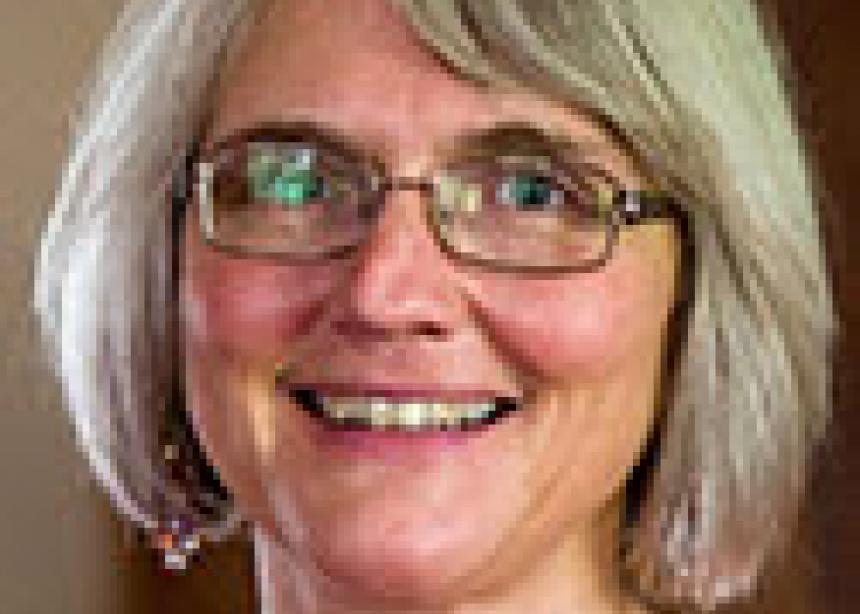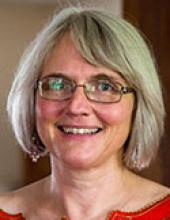I have become increasingly disturbed by the system of impunity in which Nigerians live . . . daily. Those with means and connections navigate the system. Those without resources try to live below the radar. Blame for the system can be apportioned locally and globally, but very little changes. I was forced to think about this concretely when asked to give a presentation on “Peace in the home” to an interfaith group of grassroots women who meet monthly here in Jos, where I live.
Margaret Ahmed of Home Makers, a Mennonite Central Committee (MCC) partner, began the group in 2010 after one of the episodes of violence in Jos that contributed to the increased division of Christians and Muslims. Once a month, this diverse group of women gathers to learn a home-based income-generating skill, take in a health or peace talk, and share lunch. Regularly they hold a day of fasting and prayer for peace in Plateau State. What could I, a Canadian woman with economic security and a different culture of marriage and family, have to say to this group of women?
I admire these sisters greatly. They manage households on little or no money; many cannot rely on their husbands. They have some education, but it is not enough to get good-paying jobs. It is they who suffer the most when inter-community violence erupts and they lose their husbands and children. When their homes and businesses are burnt, it is they who must first pick up the pieces and keep their families together.
They struggle each term to find school fees for their children. Sometimes they may experience hunger or inadequate shelter. Sometimes they or their children are abused. Learning from Home Makers how to bake bread for sale or make pomade (body cream) from raw materials that cost $10 in the hopes of turning a 40 percent profit is meaningful and empowering!
“Peace in the home.” I did not feel comfortable talking about conflict management skills. I did not want to offer platitudes about harmonious relationships that I perceive can easily reinforce the norms that make grassroots women’s lives difficult.
I decided to frame the talk in terms of justice or fairness, in terms of human rights. After more than 14 years in Africa, it is only this time in Nigeria that I have considered how the concept of human rights concretizes peace and development work.
When I asked the women about their definition of “peace,” they mentioned inter-relational aspects like, “no fighting,” harmonious family dynamics or “no [political] violence.”
When I asked them if they had peace in the home if there was not enough food, they responded with a unanimous “no!”
Was there peace in the home if they had a leaky roof? “No,” again.
What if there were no school fees for their children? “Of course not!” was their reply.
I pointed out that all of these things represent basic rights that all people have, as defined in such documents as the 1948 Universal Declaration of Human Rights and the 1981 African Charter on Human and People’s Rights. Nigeria has endorsed these documents. They explain that all people have cultural rights and socio-economic rights like enough food and safe shelter, along with the more well-known political rights like the right to vote or freedom of speech.
When I mentioned freedom of speech, the women laughed. Many do not have to go beyond their own doorsteps to know what it is like to be afraid to speak.
Knowing they have human rights does not mean the women must go to court to demand them, an act they could hardly fathom since corruption is rampant. Instead, I hoped our discussion would affirm their goals as women and mothers as they struggle for the peace and well-being of their families and communities. I hoped to make them aware that what they strive for in their homes are globally agreed-upon norms that all deserve, not privileges for the well-off. Rights can be violated, but they cannot be taken away.
I left that presentation feeling dubious. On the one hand, I had learnt how human rights provide a valuable framework for reinforcing human dignity. On the other, I had a sense that they went away wondering how human rights applied to their lives. They need immediate and practical things that make a real difference: how to make a bit of income, how to treat their children’s illnesses or how to manage complex relationships in close quarters.
Perhaps without knowing it, Home Makers is applying human-rights principles. Interestingly, Ahmed reports that, as women learn skills that increase their family income, this translates into greater respect for them from their husbands, elders and the wider community. Maybe human rights start with baking bread and selling skin cream.
Mary Lou Klassen works as a peace studies lecturer in Nigeria with Mennonite Central Committee (MCC). The views expressed do not necessarily represent those of MCC.




Add new comment
Canadian Mennonite invites comments and encourages constructive discussion about our content. Actual full names (first and last) are required. Comments are moderated and may be edited. They will not appear online until approved and will be posted during business hours. Some comments may be reproduced in print.